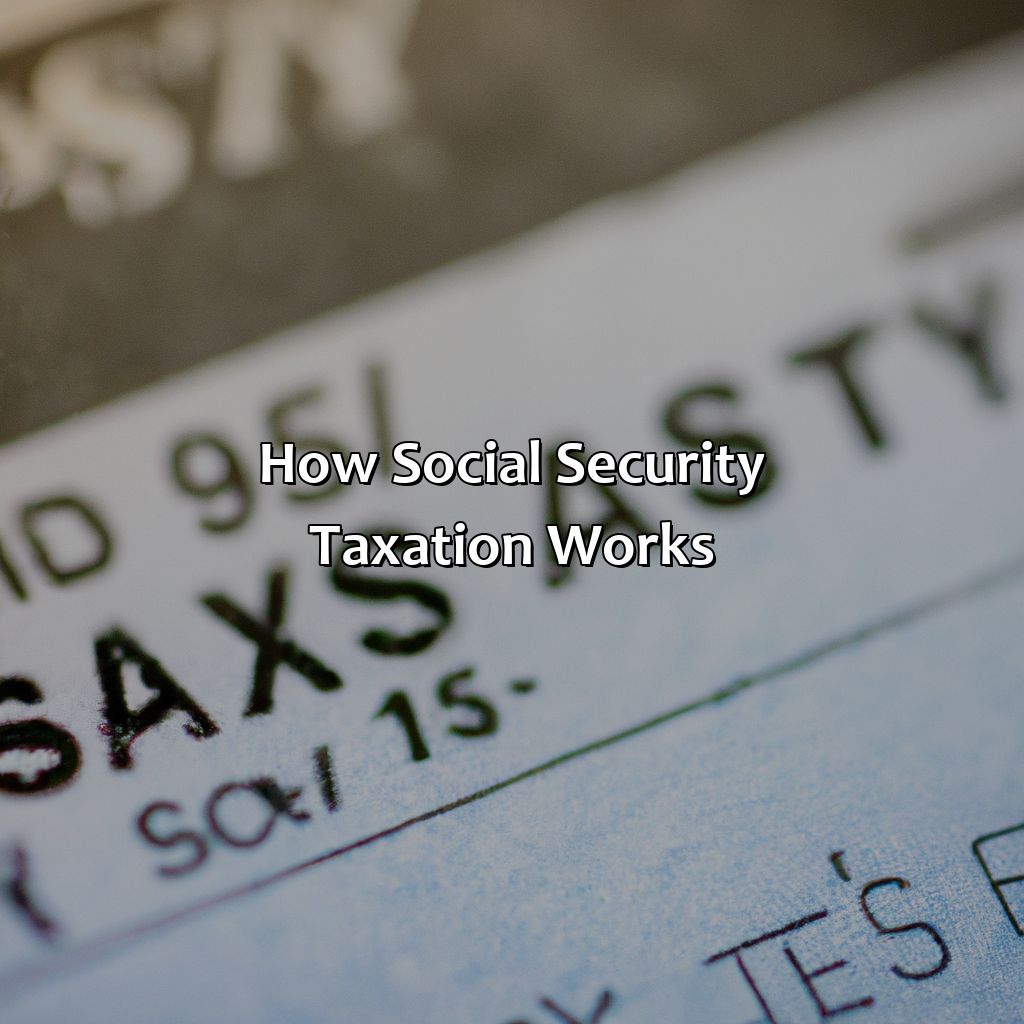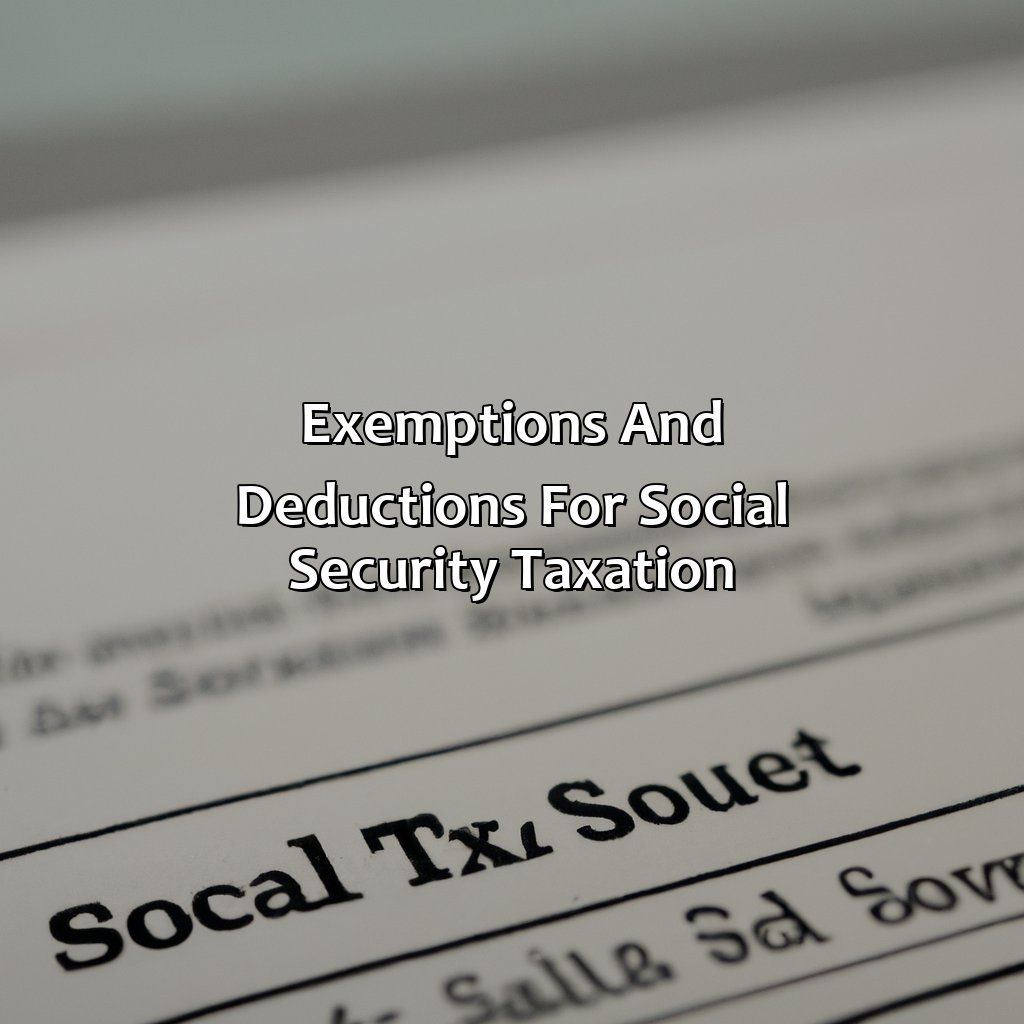Why Does Social Security Get Taxed?
Key Takeaway:
- Social Security Taxation is necessary for the sustainability of the Social Security program and to fund retirement and disability benefits.
- The Social Security tax is calculated based on an individual’s income and can vary based on income level.
- Exemptions and deductions for Social Security taxation exist, including income thresholds for exemptions and deductions for self-employed individuals.
Do you ever wonder why Social Security benefits are subject to taxation? Learn why Social Security benefits get taxed and how to potentially increase your take-home income.
How Social Security Taxation Works
To grasp Social Security Taxation, investigate this area. It talks about the calculation of Social Security Tax and how income impacts Social Security Taxation. Get to know it!

Image credits: retiregenz.com by David Washington
Calculation of Social Security Tax
The process of determining the Social Security tax you owe can be perplexing. It is calculated using a complex formula based on your earned income, which includes wages from employment or self-employment. The tax rate for Social Security consists of 12.4% with half allocated to employees and the other portion paid by employers. Self-employed individuals have to pay both parts.
To calculate your Social Security taxes accurately, you need to multiply your total earnings by the Social Security tax rate that applies to your income bracket. Only the first $142,800 of earned income in 2021 is subject to the Social Security tax. Anything beyond this amount will not be taxed under Social Security.
In addition, different rules may apply if you work for an international organization or if certain types of payments are made. As a result, it’s important to seek professional assistance from a financial advisor or a tax specialist for accurate reporting.
Don’t risk unnecessary penalties or missed benefits by not understanding how Social Security taxation works. Ensure that you stay knowledgeable on all of the regulations and policies surrounding it so that you don’t miss out on any potential benefits in the future.
The only thing certain in life are death, taxes, and the unavoidable impact of your income level on social security taxation.
Impact of Income Level on Social Security Taxation
The influence of income levels on the taxation of Social Security is significant. Understanding how this tax works may help individuals create a financial plan.
A Table representing the Impact of Income Level on Social Security Taxation:
| Income | Percent of Income Subject to Social Security Tax |
|---|---|
| $0-$142,800 (2021) | 6.2% |
| Over $142,800 (2021) | No Additional Tax |
It is essential to note that employees generally pay 6.2%, and employers match that contribution; thus, a total of 12.4% towards Social Security.
Individuals must comprehend how increases in income can impact their ability to qualify for specific benefits like Supplemental Security Income (SSI), leading to the loss or reduction of benefits.
To ease the burden of this tax, it may be helpful for individuals to create an alternate source of retirement income. A sound investment strategy and self-employment taxes can offset or reduce reliance on Social Security benefits during retirement.
Uncle Sam always finds a way to get his hands on our hard-earned money, and social security taxation is just another one of his clever schemes.
Reasons for Social Security Taxation
To grasp why social security taxes are needed, you must delve into the sustainability of the social security program. How is it funded? This section explains the retirement and disability benefits. It reveals why social security taxes are essential.

Image credits: retiregenz.com by David Arnold
Sustainability of Social Security Program
The long-term feasibility of Social Security Program is a crucial matter for policymakers. Achieving the durability of this vital system ensures its effectiveness in delivering assistance to beneficiaries. To maintain the funding balance and strengthen its solvency, payment rates, coverage criteria and legislative options are continually reviewed and analyzed.
In particular, the Social Security tax serves as a vital source of revenue for supporting payments to millions of beneficiaries nationwide. Without it, the funding reserves would be depleted faster than expected, jeopardizing the availability of benefits in the future. Hence, preserving the credibility and dependability of social security programs necessitates maintaining its operational and financial long-term sustainability.
Looking closely at how social security taxes work reveals that they serve a significant role in maintaining financial advisory services’ stability as well as provide incentives to expand coverage further. Therefore any changes or reforms made to social security programs should not overlook these essential features.
“A penny saved is a penny earned, but with social security taxes, it’s more like a penny taken…and taken…and taken…”
Funding for Retirement and Disability Benefits
The financing of benefits for both retirement and disability purposes is a significant concern that requires ongoing attention. The funds come from different sources, including the Social Security taxes paid by employees, employers and self-employed individuals. This money then goes into the Social Security trust fund.
The Social Security trust fund is a pool of money under the control of the federal government; it is allocated to various beneficiaries or programs, which in turn can access the funds whenever required. These payments are made to those who have contributed towards Social Security through their payroll taxes and meet specific eligibility criteria.
The impact of taxation on Social Security has been tremendous, with varying reactions from taxpayers across different demographics. The tax revenues have been a critical component in ensuring continued support for veteran retirees and disabled individuals. At present, there is a fear of depleting financial resources if appropriate measures are not taken soon enough to safeguard funding from potential inadequacies.
It’s important to understand why social security gets taxed so that taxpayers can appreciate how their contributions support others who need assistance in meeting their financial needs later on in life. The government must take steps to ensure adequate protection and planning for continued smooth functioning by balancing future outflows with current inflows without raising concerns among current beneficiaries or potential recipients of future benefits.
“Looks like the government’s idea of exemptions and deductions for social security taxation is about as reliable as a broken umbrella in a thunderstorm.”
Exemptions and Deductions for Social Security Taxation
Minimize your social security taxes! Learn about exemptions and deductions. “Income Thresholds for Exemptions” and “Deductions for Self-Employed Individuals” may be solutions. Read on to find out more!

Image credits: retiregenz.com by David Woodhock
Income Thresholds for Exemptions
When it comes to tax exemptions and deductions regarding social security, some income thresholds need to be considered. These thresholds determine whether one is eligible for an exemption or a deduction of their social security tax.
For instance, in 2021, an individual who earns less than $18,960 per year is exempted from paying social security tax. As for couples filing joint tax returns, the income threshold is set at $32,000 per year. However, if their income exceeds these amounts, then the rate at which they’re taxed on their social security earnings starts increasing as their income goes up.
The table below provides more detailed information about these income thresholds for different groups:
| Filing Status | Income Limit to Claim Exemption | Income Limit to Deduct Part of Benefit |
|---|---|---|
| Single | $18,960 | $25,000 |
| Married Filing Jointly | $32,000 | $32,000 |
| Married Filing Separately | Any | $0 |
It’s worth noting that certain sources of income are not subject to social security taxes. For example, distributions from retirement accounts such as IRAs or 401(k)s are considered taxable but not subject to social security taxation.
As you can see from the above table and explanation, being aware of your annual income and the corresponding thresholds is crucial when it comes to determining whether you can claim exemptions or deductions on your social security tax. Don’t miss out on any possible benefits by failing to stay informed about these limits.
Stay updated with any changes in legislation and consult a tax advisor or accountant if unsure about your eligibility for these exemptions and deductions. Being mindful of these details can help alleviate financial stress while saving you money in the long run.
Being self-employed means you get to deduct all your business expenses… including that one time you ordered pizza during a work meeting.
Deductions for Self-Employed Individuals
Self-Employed Individuals’ Tax Deductions
Self-employed individuals have a unique set of tax rules and regulations. The government offers several tax deductions, credits, and rebates to self-employed taxpayers. These deductions help them save money on taxes, which they can reinvest in their business or personal finances.
- Health insurance premiums: Self-employed individuals can deduct the cost of health insurance premiums paid for themselves, their spouses, and dependents.
- Home office expenses: Expenses related to the home office used for business purposes such as rent, electricity bills, internet fees are eligible for tax deduction.
- Startup costs: The government permits start-up businesses with immediate returns on expenses in the first year or amortization over 15 years.
- Tax preparation fees: Professional fees incurred in preparing returns of income tax (Form 1040) either personally or through an agent are eligible for reduced taxable income.
Interestingly the IRS uses several criteria to determine if a worker is self-employed and therefore eligible for deducting these expenses;The Worker must be free from control by others who are engaged in similar activities while undertaking these tasks.
A bit of trivia about self-employment taxes- it was not until 1951 that self-employed persons began paying social security taxes. Since then though matters regarding social security taxation have been directly connected with employment status determined by IRS rules.
Five Facts About Why Social Security Gets Taxed:
- ✅ Social Security benefits are taxed to help fund other government programs. (Source: AARP)
- ✅ Up to 85% of Social Security benefits can be taxed based on income level. (Source: Investopedia)
- ✅ The tax on Social Security benefits was first introduced in 1983 as part of a Social Security reform package. (Source: The Balance)
- ✅ The taxation of Social Security benefits affects about one-third of retirees. (Source: The Motley Fool)
- ✅ The amount of Social Security benefits subject to taxation is determined by the recipient’s combined income, which includes other sources of income besides Social Security. (Source: Kiplinger)
FAQs about Why Does Social Security Get Taxed?
Why does social security get taxed?
As per the Internal Revenue Service (IRS), social security benefits are classified under taxable income for certain individuals, depending upon their income level. It is due to the federal law that taxes a portion of everyone’s Social Security benefits. This law was implemented in 1983.
Who is responsible for paying tax on social security?
According to the IRS, individuals with total income, including Social Security, above a specific base amount are responsible for paying taxes on their Social Security benefits. The base amount for couples and individuals may vary and is set by law.
What is considered as total income on social security?
The total income is calculated by adding an individual’s adjusted gross income, any tax-exempt interest income, and one-half of his or her Social Security benefits. The calculation for total income varies for different filing statuses like individual, married filing separately, and married filing jointly.
What is the percentage of social security that gets taxed?
The percentage of Social Security benefits that is taxed varies depending on an individual’s income bracket. Up to 85% of Social Security benefits are subject to tax for individuals whose total income exceeds the base amount, which is set by law.
Can I reduce my social security taxes?
Individuals can reduce their Social Security taxes by reducing their taxable income. They could do it through charitable contributions, health savings accounts, 401(k) contributions, and other deductions. However, reducing the income might reduce Social Security benefits in return.
What happens if I don’t pay taxes on my social security?
If an individual fails to pay taxes on his or her Social Security benefits, it may result in penalties and interest charges. The IRS could also take legal action against the individual and seize their assets to settle the tax debt.


